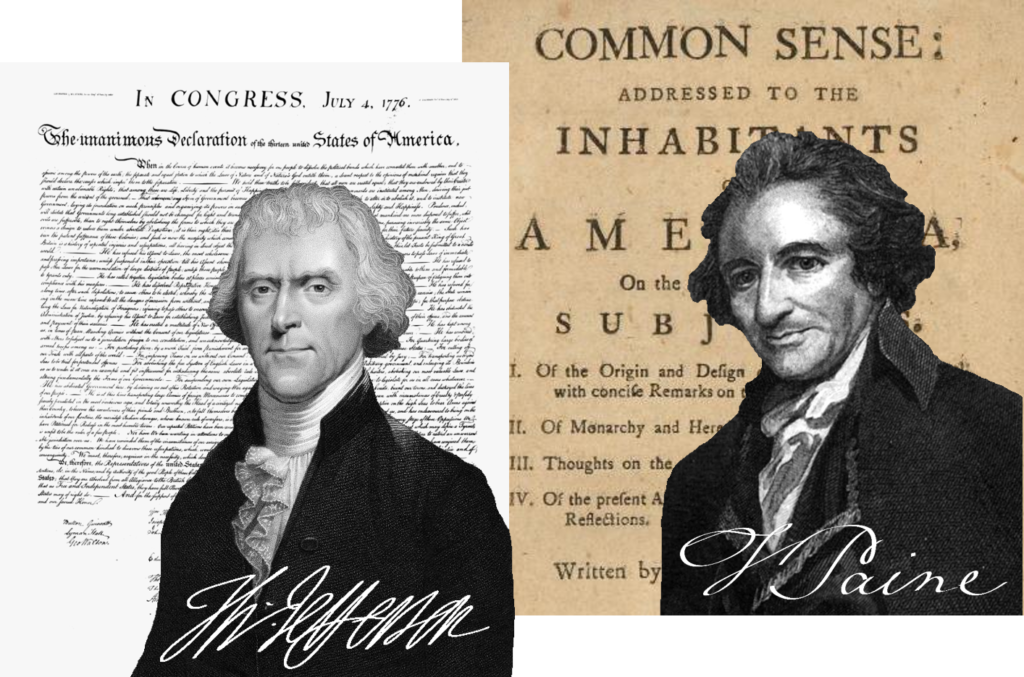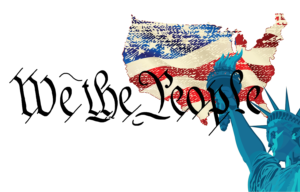As most people are aware, Independence Day marks the adoption of the Declaration of Independence by the Second Continental Congress on July 4, 1776 — a document declaring the American colonies’ independence from Great Britain. For the most part, the document was a finger-pointing exercise explaining why the American colonies wanted to be independent from Great Britain. It declares, “The history of the present King of Great Britain is a history of repeated injuries and usurpations, all having in direct object the establishment of an absolute tyranny over these states. To prove this, let facts be submitted to a candid world.” What follows is a litany of complaints against King George III. Many people don’t know that many of these grievances were laid out earlier in a pamphlet written by Thomas Paine entitled Common Sense. In that document, he wrote about the King of England’s “long and violent abuse of power” and declared “the cause of America is in a great measure the cause of all mankind.”
In the book First Principles: What America’s Founders Learned from the Greeks and Romans and How That Shaped Our Country, Pulitzer Prize winning author Thomas Ricks, reports that Common Sense became “a national sensation, appearing in some twenty-five editions within the year.” One might think that Paine was a lifelong resident of America to have such strong feelings. The truth is, he only immigrated from England in 1774, two years before the Declaration of Independence was adopted. Paine was a keen observer of social and political history. In Common Sense, which was published only six months before the Declaration of Independence, he noted, “Society is produced by our wants, and government by our wickedness; the former promotes our happiness positively by uniting our affections, the latter negatively by restraining our vices. The one encourages intercourse, the other creates distinctions.” He could have been writing about the political strife that divides America today. He concluded, “Society in every state is a blessing, but government, even in its best state, is but a necessary evil; in its worst state an intolerable one; for when we suffer, or are exposed to the same miseries by a government, which we might expect in a country without government, our calamity is heightened by reflecting that we furnish the means by which we suffer.”
The founding fathers, however, were not anarchists. They wanted a government — a good government. As Ricks points out, in a postscript to Common Sense, appended a month after its first appearance, Paine wrote, “We have it in our power to begin the world over again. A situation, similar to the present, hath not happened since the days of Noah until now. The birth-day of a new world is at hand.” Ricks concludes, “This was indeed a new voice, bright and clear.” And, in order to establish that good government, the founding fathers knew they had to break free from British dominance. Thomas Jefferson, the primary author of the Declaration of Independence, clearly understood the power of plain speaking as demonstrated by the popularity of Common Sense. Ricks reports, following the publication of the Declaration, Jefferson noted, “This was the object of the Declaration of Independence. Not to find out new principles, or new arguments, never before thought of, not merely to say things which had never been said before; but to place before mankind the common sense of the subject.” Ricks adds, “Jefferson’s explicit use here of ‘common sense’ was perhaps a nod toward the influence of Paine. Jefferson had received the pamphlet in the mail in February of 1776, not long after it was published.”
According to Ricks, Jefferson modestly indicated that his intent in authoring the Declaration was not just to present his own views but to give “expression of the American mind, and to give to that expression the proper tone and spirit called for by the occasion.” Ricks, however, believes Jefferson’s sentiment “was disingenuous.” He explains, “Jefferson really was attempting something far more difficult. He was employing a plain American idiom while attempting to move the American mind into the future. He was pushing them hard, and far beyond any existing consensus. One month before the Declaration was passed, only four colonies had instructed their delegates to support independence. But the Declaration’s appearance would do much to change that.”
The value of the Declaration of Independence has been proven through the years, that value being drawn from oft-repeated phrases like the document’s list of “unalienable rights” — “life, liberty and the pursuit of happiness.” For nearly 250 years, those words have described the aspirations of the American people. Ricks, however, believes, “The second paragraph [of the Declaration] is probably the key passage of writing in all of American history. In it, Jefferson sets forth the beliefs of these people who are declaring themselves a new nation upon the Earth. We can all recall how it begins: ‘We hold these truths to be self-evident, that all men are created equal.’ The last five words of that sentence sweep aside millennia of unequal births and preordained lives and define these new Americans as a people who subscribe to a revolutionary belief. In the context of the late 1700s, it is even a bit pugnacious: Do you think you are better than us? In this new nation, all people — or at least all white men — would have equal standing before the law.”
It would take nearly two centuries, for that sentiment to include people of color. During his famous “I Have a Dream” speech, delivered from the steps of the Lincoln Memorial in 1963, Dr. Martin Luther King, Jr., said, “In a sense we have come to our nation’s capital to cash a check. When the architects of our republic wrote the magnificent words of the Constitution and the Declaration of Independence, they were signing a promissory note to which every American was to fall heir. This note was a promise that all men, yes, black men as well as white men, would be guaranteed the unalienable rights of life, liberty, and the pursuit of happiness.” He added, “I have a dream that one day this nation will rise up and live out the true meaning of its creed: ‘We hold these truths to be self-evident, that all men are created equal.’”
One might believe that the founding fathers were men who thought alike. That is not true. They held all sorts of differing opinions. What they did do was talk to one another. Journalist Matt Rasnic reports, “[In an episode of PBS News Hour,] Judy Woodruff asked Robb Willer, director of the Polarization and Social Change Lab at Stanford University, what people can do on an individual level to bridge [today’s political] divide. His No. 1 piece of advice: ‘try to run towards the fire, rather than away from it.’ In other words, engage, through respectful conversation. ‘Whoever that person is in your family or your neighborhood, engage with them respectfully, and try to give them that interaction that they’re not getting now, where they see that you can disagree with somebody, and it could still be a respectful conversation,’ he said. Research has found that when political candidates voice support for honoring election results, there are promising effects when it comes to alleviating tensions and promoting democracy.” That’s good advice and a great way to honor the country on this Independence Day. The majority of Americans want the country to come together rather than split apart — only respectful dialogue can accomplish that goal. We should remember that truth as we all celebrate the nation’s birthday.





